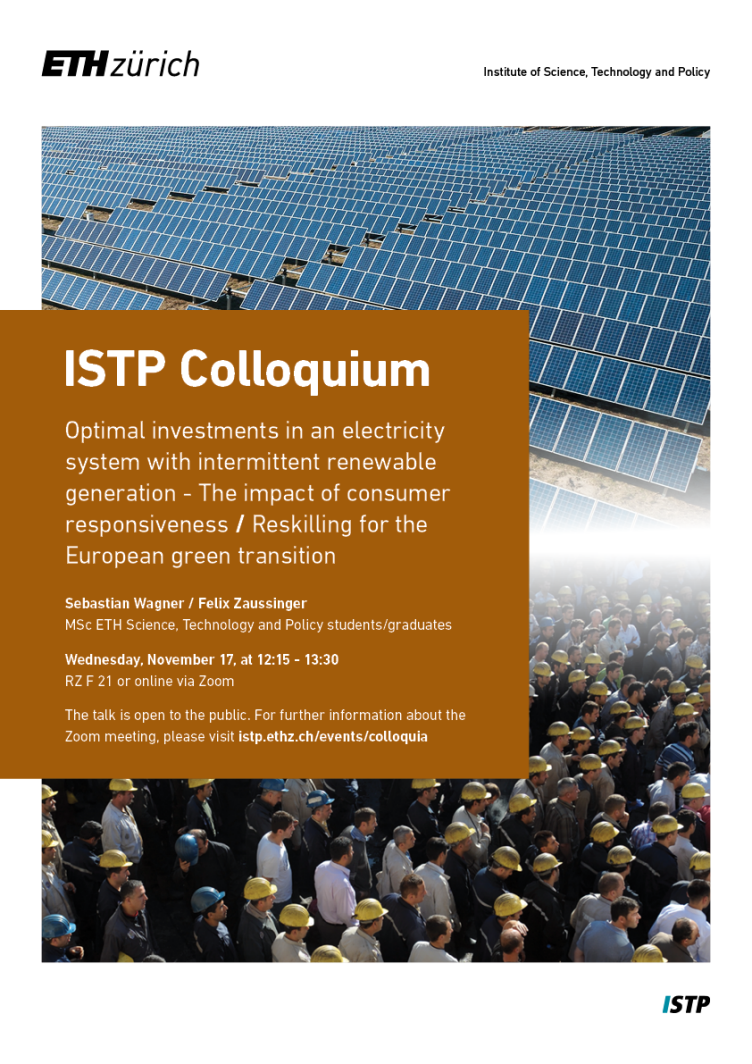Colloquium: Sebastian Wagner and Felix Zaussinger
Wednesday, Nov 17, 2021, at 12.15 - 13.30
Room RZ F 21 or Online, Zoom | Sign up here
Sebastian Wagner: Optimal investments in an electricity system with intermittent renewable generation - The impact of consumer responsiveness
Based on a partial equilibrium model in which consumers derive utility from electricity, we derive the social optimum with regard to investments in electricity generation of fossil and renewable generators, storage, and responsive demand. Environmental factors such as wind or solar irradiation lead to intermittent availability of renewable generation, which storage capacity and a variable share of responsive consumers can mitigate. We analytically solve the model to evaluate the effects of varying environmental cost due to pollution from fossil electricity generation and of technology costs. In general, a higher share of responsive consumers leads to optima with higher renewable capacity and lower fossil generation overall. However, in some cases responsive demand leads to counter-intuitive effects and decreases optimal investments in renewables or increases fossil electricity generation. While being theoretical, the results lead to general implications for policymakers; foremost that responsive demand may have opposing effects at different levels of renewable diffusion.
About Sebastian Wagner
Felix Zaussinger: Reskilling for the European green transition
Mitigating dangerous levels of anthropogenic climate change requires a global green transition. In the European Union, the European Green Deal serves as the framework for the policy-driven transition to a carbon-neutral economy by 2050. This transition will affect industries, value chains and ultimately jobs across the entire economy. While there is overwhelming evidence that the green transition results in net job creation, the shift away from fossil fuels also creates regionally concentrated losses. The Just Transition framework emphasises that the transition not only needs to be ecologically sustainable, but also socially equitable. Workers employed in declining industries need to be supported in transitioning to growing industries through retraining, reskilling and upskilling. However, it is presently unclear to what extent the skills of workers in at-risk "brown" occupations are transferable to the work demands of emerging "green" occupations.
Against this background, this thesis aims at gaining a more rigorous understanding of the role of skills for the European green transition. An existing mapping between 2900 occupations and 13000 skills, three green transition scenarios and granular labour force surveys form the empirical basis of the study. The methodological approach combines descriptive analyses of detailed occupation similarity measures and multi-constraint occupation transition pathways with reskilling simulation. The thesis closes with an in-depth case study on coal workers in Germany and a brief exploration of the nexus between the labour market impacts of the green transition, automation and COVID-19.
Based on the preferred scenario, the first part of the analysis shows that workers in the majority of brown occupations have above-average reskilling requirements and face multiple barriers to transitions into green jobs. The second part, based on a case study on Germany, shows that the number of desirable transition pathways out of coal jobs and their associated earning changes vary greatly depending on the regional context. For all of Germany, the analysis suggests net annual earning losses of €288 million (€8000 per at-risk worker on average). Simulation of targeted reskilling results in a two-fold increase in the number of desirable transition pathways available to at-risk coal workers. Targeted reskilling moreover averts all earnings losses, leading to net annual earnings gains of €8 million (€235 per worker on average). It is also shown that brown occupations are at a low risk of being automated, but were disproportionately exposed to the pandemic. These findings highlight the timely imperative of reskilling for a just and green transition.
About Felix Zaussinger
Zaussinger is about to graduate from the MSc STP programme with a minor in Resources & Environment. In April 2021, he joined the Energy and Technology Policy (EPG) group to conduct his master thesis research on the role of reskilling for the Euopean green transition, for which he collaborated with the Amsterdam-based social enterprise SkillLab. Prior to his studies at ETH, Felix obtained a bachelor’s degree in Geomatics Engineering with a specialisation in Environmental Remote Sensing from TU Wien, Austria. After his graduation in November, Felix will further develop the thesis project together with his colleagues at EPG and keep an eye out for interesting policy/sustainability related jobs in the private or public sector.
